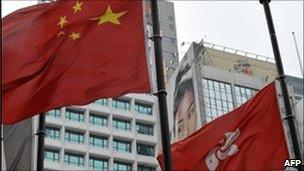Viewpoint: HK yuan trade
- Published

Renminbi denominated deposits are on the rise in Hong Kong
The Stock Exchange of Hong Kong is testing out its system for trading yuan-denominated securities on Saturday and Sunday.
If all goes as planned, it should pave the way for more listings. One expert tells us why that matters.
Hong Kong is full of Chinese money.
According to the special administrative region's de facto central bank, The Hong Kong Monetary Authority, deposits denominated in renminbi, or the yuan, have surged.
In January 2011, they totalled 370.6bn ($56.4bn; ÂĢ35.2bn), up sixfold from November 2009.
That increase is down to Beijing slowly encouraging the liberalisation of a currency that has, in the past, remained pretty much isolated.
'Dim Sum' bonds
One of the main ways it has opened up the currency is through "dim sum" bonds, or yuan-denominated debt securities.
Corporates and banks have issued about 36bn yuan's worth of these bonds in Hong Kong 2010.
At the same time, yuan-denominated bank deposits have also grown apace, as the currency is increasingly used to settle international trade transactions and is expected to appreciate against the US dollar by some 3% to 5% per annum over the next five years.
But while more of China's currency has been flowing to Hong Kong, the issue with the offshore deposits has always been what to spend that wall of money on.
Not least because the Chinese government has been concerned in particular that some of it might be repatriated to the mainland and fuel inflation, which currently is running at about 4.9% a year.
So, at present, holders of offshore yuan savings accounts can only deposit foreign currency, and enjoy the benefits of the foreign exchange appreciation of the yuan.
For current accounts, cheques can be issued in Hong Kong and to retailers in Guandong province on the mainland for consumer spending, but there are significant caps and limitations on the amount of renminbi that can be remitted to China.
Hence, the idea behind the sale of yuan-denominated securities in Hong Kong.
Issuers could sell about $10bn-worth of dim sum bonds this year
Trading simulation
Issuers are expected to sell some $10bn-worth of dim sum bonds this year, and the market is then likely to also extend to equities, with a proposed initial public offering (IPO).
Earlier this year, Cheung Kong Holdings, a Hong Kong-listed conglomerate controlled by Li Ka-shing, the territory's richest man who has been nicknamed "superman" by locals, was said to be working on an IPO denominated in renminbi.
The timing of the deal has not been publicly announced, although there has been speculation that it might come to market as early as the end of March 2011.
The decision by the Stock Exchange of Hong Kong to do the trading simulation now would seem to indicate a reasonably close timetable for the launch of the transaction.
But rather than sell simple shares worth billions of yuan, the company wants to do it via a real estate investment trust (or REIT).
A REIT enables a company to transfer to institutional and retail investors, through a stock exchange listing, its ownership of physical property, while receiving ongoing fees for the management of these real estate assets.
The idea behind the proposed sale of a REIT, rather than of a more a straightforward share listing, is that REITs pay a high dividend - so many investors will be encouraged to buy and hold the stock, rather than actively trade it.
It is hoped that by doing this, the market can get past one of its biggest stumbling blocks; a lack of liquidity that would stop an active offshore market from developing in renminbi equities.
Modest steps
As of early March 2011, only 60% of Hong Kong's brokers had opened yuan trading accounts, and the main worry is that the market for yuan IPOs in Hong Kong may end up mirroring that for China's "B" shares.
These are listed and traded by domestic investors in Shanghai and Shenzhen, but denominated in US and Hong Kong dollars respectively.
An active market failed to develop in B shares as there were few investors in the mainland with access to foreign currency.
Accordingly, Hong Kong's stock exchange unveiled earlier this month a facility to support trading in yuan-denominated securities.
The plan is that Chinese currency would be obtained from banks by the stock exchange, and provided in turn to brokers, who could then offer it to their clients.
Investors are currently restricted under Chinese regulations from exchanging more than 20,000 yuan per day.
These steps are modest and there is a still a long way ahead before Beijing fully floats its currency and opens up its capital markets.
But as the testing on the stock market in Hong Kong shows, there is no doubt that China will increasingly become a noted player on the global financial stage.
Philippe Espinasse worked as an investment banker in the US, Europe and Asia for more than 19 years and now writes and works as an independent consultant in Hong Kong. The opinions expressed are those of the author and are not held by the ģÉČËŋėĘÖ unless specifically stated. The material is for general information only and does not constitute investment, tax, legal or other form of advice. You should not rely on this information to make (or refrain from making) any decisions. Links to external sites are for information only and do not constitute endorsement. Always obtain independent, professional advice for your own particular situation.